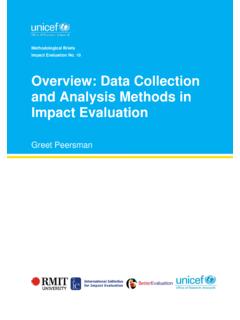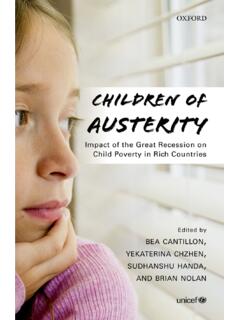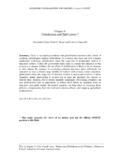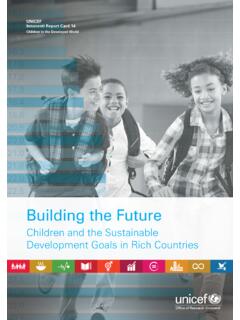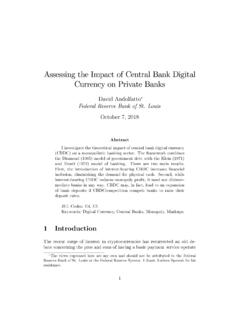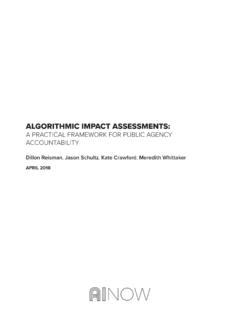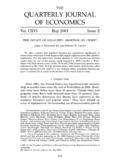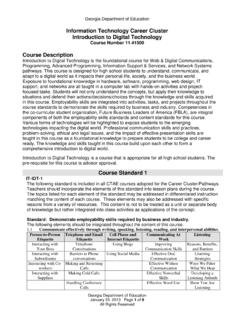Transcription of How does the time children spend using digital technology ...
1 How does the time children spend using digital technology impact their mental well-being, social relationships and physical activity ? An evidence-focused literature review. IDaniel Kardefelt-WintherDecember 2017 How does the time children spend using digital technology impact their mental well-being, social relationships and physical activity ?An evidence-focused literature review Innocenti Discussion Paper 2017-02 How does the time children spend using digital technology impact their mental well-being, social relationships and physical activity ? An evidence-focused literature review. 1 THE UNICEF OFFICE OF RESEARCH INNOCENTIThe Office of Research Innocenti is UNICEF s dedicated research centre. It undertakes research on emerging or current issues in order to inform the strategic directions, policies and programmes of UNICEF and its partners, shape global debates on child rights and development, and inform the global research and policy agenda for all children , and particularly for the most vulnerable.
2 Publications produced by the Office are contributions to a global debate on children and may not necessarily reflect UNICEF policies or approaches. The views expressed are those of the Office of Research Innocenti receives financial support from the Government of Italy, while funding for specific projects is also provided by other governments, international institutions and private sources, including UNICEF National further information and to download or order this and other publications, please visit the website at: DISCUSSION PAPERSD iscussion Papers are signed pieces by experts and researchers on current topics in social and economic policy and the realization of children s rights. The aim is to encourage reflection and stimulate wide-ranging is a peer reviewed text has not been edited to official publication standards and UNICEF accepts no responsibility for errors. Extracts from this publication may be freely reproduced with due to utilize larger portions or the full publication should be addressed to the Communication Unit at: readers wishing to cite this document we suggest the following form: Kardefelt-Winther, D.
3 How does the time children spend using digital technology impact their mental well-being, social relationships and physical activity ? An evidence-focused literature review. Innocenti Discussion Paper 2017-02, UNICEF Office of Research Innocenti, should be addressed to:UNICEF Office of Research InnocentiPiazza SS. Annunziata, 1250122 Florence, ItalyTel: (+39) 055 20 330 Fax: (+39) 055 2033 does the time children spend using digital technology impact their mental well-being, social relationships and physical activity ? An evidence-focused literature review. 3 HOW DOES THE TIME children spend using digital technology impact THEIR MENTAL WELL-BEING, social RELATIONSHIPS AND physical activity ? AN EVIDENCE-FOCUSED LITERATURE Daniel Kardefelt-WintherResearch Coordinator, UNICEF Office of Research - InnocentiABSTRACTB ased on an evidence-focused literature review, the first part of this paper examines existing knowledge on how the time children spend using digital technology impacts their well-being across three dimensions; mental/psychological, social and physical .
4 The evidence reviewed here is largely inconclusive with respect to impact on children s physical activity , but indicates that digital technology seems to be beneficial for children s social relationships. In terms of impact on children s mental well-being, the most robust studies suggest that the relationship is U-shaped, where no use and excessive use can have a small negative impact on mental well-being, while moderate use can have a small positive impact . In the second part of the paper, the hypothetical idea of addiction to technology is introduced and scrutinized. This is followed by an overview of the hypothetical idea that digital technology might re-wire or hijack children s brains; an assumption that is challenged by recent neuroscience evidence. In conclusion, considerable methodological limitations exist across the spectrum of research on the impact of digital technology on child well-being, including the majority of the studies on time use reviewed here, and those studies concerned with clinical or brain impacts.
5 This prompts reconsideration of how research in this area is conducted. Finally, recommendations for strengthening research practices are : digital technology , time use, excessive use, well-being, mental health, physical activity , social relationships, author would like to thank the many colleagues who provided feedback, knowledge and support during the writing of this paper. In particular, Jasmina Byrne at UNICEF Office of Research Innocenti, who provided continuous feedback and advice throughout the writing process and contributed towards improving the quality of the final product. Discussions with the editorial team for UNICEF s State of the World s children report - Brian Keeley, Celine Little and Achila Imchen at UNICEF s Division of Communication in New York - helped shape the paper from the outset. Their guidance was crucial in identifying the most pertinent topics for inclusion in this background paper to the 2017 State of the World s children are also extended to Dr Joar Guterstam at the Karolinska Institute and Dr Kate Mills at the University of Oregon, who provided important knowledge from neuroscience research with respect to the role of dopamine in addiction and the impact of digital technology on child brain development.
6 Special thanks go to Dr Lucia Ferrone at UNICEF Office of Research Innocenti, for many engaging discussions on the topic and Sarah Marchant at UNICEF Office of Research - Innocenti, for her editorial support. Finally, the author wishes to express his sincere appreciation for the insights and comments provided by Dr Sarah Cook, Director of UNICEF Office of Research Innocenti and the two external reviewers of this paper, Professor Christopher Ferguson at Stetson University and Dr Andrew Przybylski at the University of Oxford. 1 This paper was developed as a background paper to UNICEF s State of the World s children report for 2017. A summary of this paper and some of its findings will be included in the report. How does the time children spend using digital technology impact their mental well-being, social relationships and physical activity ? An evidence-focused literature review. 5 TABLE OF CONTENTS1. Executive Summary How does the time children spend using digital technology impact their mental well-being?
7 How does the time children spend using digital technology impact their social relationships? How does the time children spend using digital technology impact their physical activity ? Conclusions and recommendations for future research 72. Introduction Terminology and theoretical assumptions Methodology Limitations 143.
8 Literature review impact of time spent using digital technology on children s mental well-being impact of time spent using digital technology on children s social relationships impact of time spent using digital technology on children s physical activity 194. Can the use of digital technology be addictive? What do we know about those who spend so much time using digital technology that they experience severe negative outcomes in life? Can digital technologies hijack or rewire children s brains and make them addicted? 235. Discussion 256. Conclusions 267.
9 References 28 How does the time children spend using digital technology impact their mental well-being, social relationships and physical activity ? An evidence-focused literature review. 6 EXECUTIVE SUMMARYThe first part of this paper reviews existing knowledge on how the time children spend using digital technology impacts their well-being, in order to understand when and why digital technology has a positive or negative influence on children . This is relevant as children s engagement with digital technology is increasing in all parts of the world, together with concerns about whether this is healthy or harmful. The methodology used is an evidence-focused literature review which includes studies of children aged 0-18. In addition to summarizing existing evidence, the paper emphasizes the methodological limitations that exist in this area of research.
10 The literature is reviewed in light of these limitations to determine how much it can truly tell us about the impacts on child well-being. The paper highlights that methodological limitations need to be more carefully considered in research, attributing the general lack of conclusive evidence to such limitations. The paper offers concrete recommendations on how research in this area might be second part of the paper engages with the hypothetical idea of addiction to technology , in light of increasing concerns that some children s excessive engagement with digital technology may be a mental disorder that could cause significant long-term harm. The theoretical assumptions underpinning this body of research are reviewed together with existing knowledge around risk-factors. Methodological limitations, which are particularly severe in this area, are also given due consideration. The popular-science notion that digital technology may re-wire or hijack children s brains is also scrutinized, drawing on recent neuroscience evidence.
